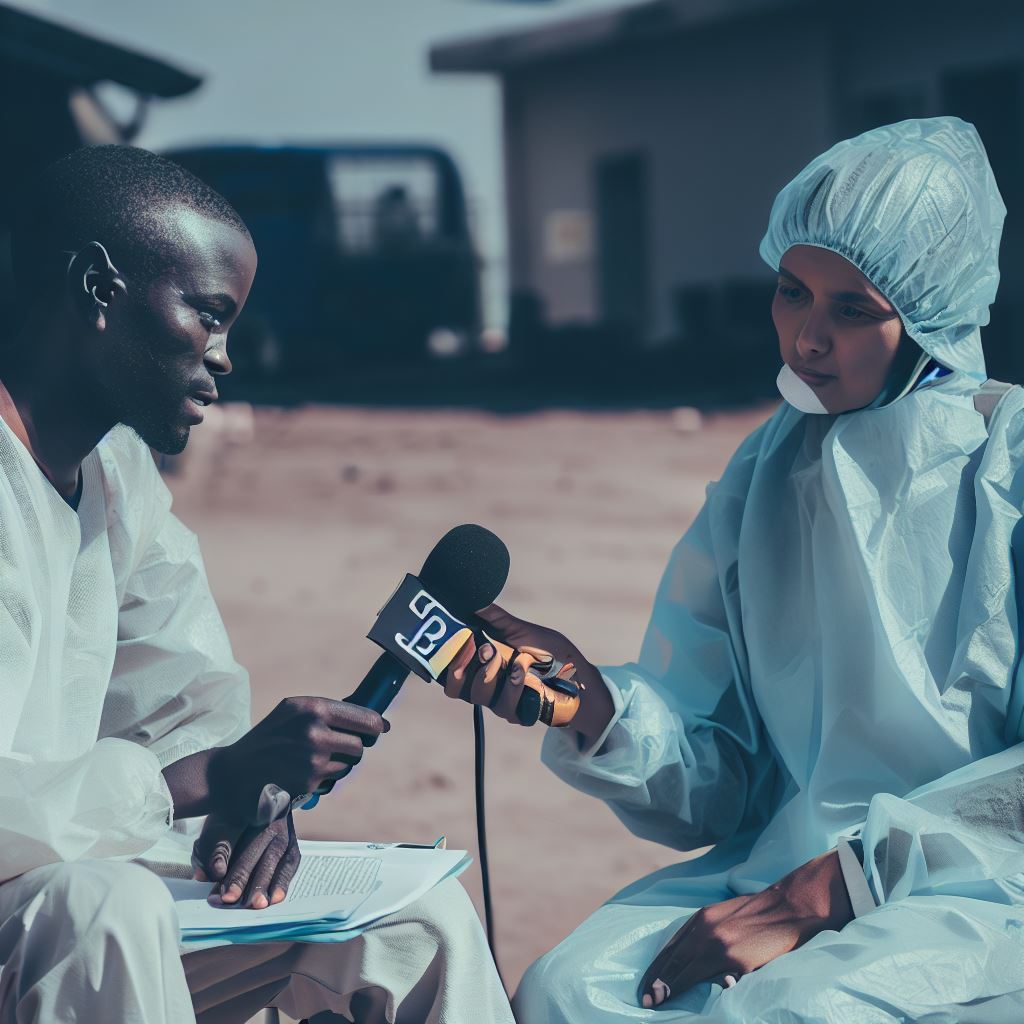Introduction
Biostatistics is the application of statistical methods to biological, health, and medical data analysis.
Biostatisticians play a crucial role in the healthcare industry by interpreting and analyzing complex data to inform decision-making and improve public health outcomes.
In Nigeria, the job market for biostatisticians is steadily growing due to the increasing demand for data-driven healthcare strategies.
Biostatisticians are in high demand as they use their expertise to design research studies, analyze data, and contribute to evidence-based medical decisions.
They collaborate with healthcare professionals, epidemiologists, and researchers to ensure accurate data analysis.
They also provide statistical support for clinical trials and help in risk assessment and disease surveillance in public health initiatives.
In Nigeria, the job market for biostatisticians is expanding due to the government’s recognition of the importance of data-driven healthcare strategies.
Nigeria sees a rise in institutions needing biostatisticians for handling data and statistical analysis in research, academia, and healthcare.
Furthermore, the need for data-driven decision-making in healthcare policy and planning has created more opportunities for biostatisticians in Nigeria.
In fact, biostatisticians play a crucial role in the healthcare industry, ensuring that decisions are based on accurate data analysis.
In Nigeria, the job market for biostatisticians is growing as the demand for evidence-based strategies in healthcare increases.
The potential for career advancement and the impact on public health make biostatistics an exciting field in Nigeria.
Current State of the Biostatistician Job Market in Nigeria
In this section, we will analyze the current state of the biostatistician job market in Nigeria.
We’ll explore biostatistician employment numbers, healthcare demand, and urban vs. rural job prospects in Nigeria.
Number of biostatisticians employed in Nigeria
The field of biostatistics is relatively new in Nigeria, but it is growing steadily.
Currently, there are approximately 500 biostatisticians employed in various sectors across the country.
Demand for biostatisticians in the healthcare sector
The demand for skilled biostatisticians in the healthcare sector is increasing rapidly.
With the rise in health research and clinical trials, there is a greater need for professionals who can analyze and interpret data effectively.
Comparison of job opportunities for biostatisticians in urban and rural areas
- Job opportunities for biostatisticians are more abundant in urban areas compared to rural areas.
- This is mainly due to the concentration of healthcare institutions, research centers, and universities in cities.
- Urban areas provide access to a larger pool of resources and opportunities for professional growth.
- Biostatisticians in cities have the advantage of working with renowned institutions and collaborating with experts in the field.
- In contrast, job opportunities for biostatisticians in rural areas are limited.
- Healthcare facilities and research institutions are scarce in these areas, leading to fewer job openings for biostatisticians.
- However, there is still potential for growth in rural areas as the government is making efforts to improve healthcare infrastructure and research facilities in these regions.
To increase job opportunities for biostatisticians in Nigeria, it is crucial to invest in the development of the field.
This includes providing specialized training and education programs, promoting research collaborations, and creating incentives for biostatisticians to work in rural areas.
In short, the biostatistician job market in Nigeria is growing, but there are challenges that need to be addressed.
The demand for biostatisticians is increasing in the healthcare sector, particularly in urban areas.
However, job opportunities in rural areas are still limited.
Recognizing biostatistics’ value and fostering growth can build a thriving job market, advancing healthcare research in Nigeria.
Read: Salary Guide: Biostatisticians in Nigeria 2023
Factors Affecting the Biostatistician Job Market in Nigeria
Biostatistics is a burgeoning field in Nigeria, but several factors influence the job market for biostatisticians.
Understanding these factors is important for both aspiring biostatisticians and policymakers looking to develop the field further.
Educational requirements for biostatisticians
- To become a biostatistician in Nigeria, individuals must obtain the necessary educational qualifications.
- This typically includes a minimum of a Bachelor’s degree in Biostatistics or a related field.
Availability and quality of educational programs in biostatistics
The availability and quality of educational programs play a significant role in shaping the biostatistician job market.
Institutions that offer comprehensive and rigorous biostatistics programs attract better job opportunities for graduates.
Government policies and initiatives supporting the development of biostatistics in Nigeria
- Well-crafted government policies and initiatives can significantly impact the growth of the biostatistician job market.
- By providing funding, scholarships, and incentives, the government can encourage the establishment of more biostatistics programs and research opportunities.
In essence, several factors affect the job market for biostatisticians in Nigeria.
Consider factors like education, program quality, government support, industry ties, healthcare demand, funding, perception, networking, tech, and global trends.
By understanding and addressing these factors, Nigeria can further develop its biostatistical workforce and provide better career opportunities for aspiring biostatisticians.
Read: A Day in the Life of a Nigerian Biostatistician
Challenges in the Biostatistician Job Market in Nigeria
The biostatistician job market in Nigeria is faced with several challenges that hinder its growth and development.
These challenges include:
Limited awareness and understanding of biostatistics as a career
- Biostatistics remains a hidden gem in Nigeria’s job landscape, with many unaware of its potential.
- This lack of awareness results in a scarcity of skilled biostatisticians in the workforce.
- Biostatistics offers vital contributions to healthcare research, yet its obscurity hinders its growth.
- The shortage of qualified biostatisticians can impact the quality and effectiveness of healthcare interventions.
- Individuals who might excel in biostatistics often pursue other career paths due to a lack of knowledge about its possibilities.
Lack of infrastructure and resources for biostatistical research
In Nigeria, biostatistical research faces hurdles due to inadequate infrastructure and resource deficiencies.
- The absence of well-equipped statistical laboratories restricts in-depth analysis and experimentation.
- Access to reliable data sources, a fundamental requirement for biostatistical research, is often limited or inconsistent.
- These limitations hinder the ability to conduct comprehensive studies and generate meaningful insights.
- Biostatisticians grapple with outdated technology and a scarcity of modern tools necessary for effective research.
Brain drain
- Experienced biostatisticians are departing Nigeria, posing a major challenge to the country’s job market.
- Low salaries, job insecurity, and limited career growth push professionals to seek greener pastures overseas.
- This exodus robs Nigeria of its valuable talent, impacting the healthcare and research sectors.
- The loss of seasoned biostatisticians hinders the nation’s ability to tackle health challenges effectively.
- These professionals often contribute significantly to global research and innovation, but Nigeria’s environment fails to retain them.
Generally, the challenges in Nigeria’s biostatistician job market hinder the growth and development of the profession.
Addressing these challenges is crucial to creating a robust job market that can contribute significantly to public health research and policy-making in Nigeria.
Read: Healthcare Impact of Biostatisticians in Nigeria

Opportunities for Growth in the Biostatistician Job Market in Nigeria
When it comes to the job market for biostatisticians in Nigeria, there are several key areas that offer opportunities for growth and development.
In this blog section, we will explore some of these areas and how they can contribute to the advancement of the field.
Collaboration between academic institutions, research centers, and healthcare organizations
- Increased collaboration between academic institutions, research centers, and healthcare organizations can result in better data collection and analysis.
- By working together, these institutions can pool their resources and expertise to tackle complex health issues.
- Collaboration can also lead to the development of innovative research methodologies and statistical techniques.
- Through partnerships, biostatisticians can have access to a wider range of data sources, leading to more comprehensive and accurate analyses.
- Furthermore, collaboration can enhance the translation of research findings into policy and practice, thus improving public health outcomes.
Increased investment in biostatistical research and development
- Increased investment in biostatistical research and development can lead to the expansion of job opportunities in Nigeria.
- With more funding, researchers can explore new areas and conduct more studies, resulting in a greater need for biostatisticians.
- This investment can support the hiring of additional staff and the establishment of biostatistics departments in academic and research institutions.
- More funding can support training programs and workshops for current biostatisticians, boosting their skills.
- Investment in research and development can also attract international collaborations and partnerships, further boosting the job market.
Leveraging technology to improve data analysis and reporting
- The advancement of technology has the potential to revolutionize the field of biostatistics in Nigeria.
- By leveraging technology, biostatisticians can streamline data collection, analysis, and reporting processes.
- Automation and machine learning algorithms can help in handling large datasets and identifying patterns or trends.
- Software tools and platforms can facilitate collaborative work and enable visualization of complex statistical models.
- Furthermore, technology can enable real-time monitoring and surveillance, leading to timely interventions and data-driven decision-making.
Basically, the biostatistician job market in Nigeria offers promising opportunities for growth.
Collaboration between academic institutions, research centers, and healthcare organizations can lead to significant advancements in the field.
Increased investment in research and development can expand job opportunities and promote the establishment of dedicated biostatistics departments.
Leveraging technology has the potential to enhance data analysis and reporting processes, leading to more accurate and timely insights.
By embracing these opportunities, Nigeria can strengthen its biostatistician job market and contribute to advancements in public health.
Read: The Role of Biostatisticians in Nigeria’s Pharma
Advice for Aspiring Biostatisticians in Nigeria
Aspiring biostatisticians in Nigeria can take several steps to enhance their career prospects:
Pursuing relevant educational programs and certifications
- Enhance your career by pursuing relevant biostatistics and related field educational programs and certifications.
- These programs offer specialized knowledge and skills necessary for success in the biostatistical field.
- Consider enrolling in accredited universities or institutions that offer comprehensive biostatistics courses and certifications.
- Biostatistics programs cover various aspects, including statistical methodologies, data analysis, and research methodologies tailored to healthcare and life sciences.
- Many universities offer online courses, allowing flexibility for working professionals to acquire the required knowledge.
- Certifications such as the Certified Biostatistician (CB) designation can validate your expertise and enhance your career prospects.
- Continuously updating your skills and knowledge through relevant programs ensures you remain competitive in the job market.
Gaining practical experience through internships and research projects
- Boost your biostatistics career by gaining hands-on experience through internships and research projects.
- Internships offer exposure to real-world scenarios, allowing you to apply theoretical knowledge to practical situations.
- Working alongside experienced professionals, you can learn the nuances of biostatistical analysis and research methodologies.
- Research projects provide opportunities to contribute to meaningful studies, honing your analytical skills and problem-solving abilities.
- Hands-on experience enhances your proficiency in statistical software and data analysis tools commonly used in the field.
- It’s a chance to collaborate with healthcare professionals and researchers, expanding your network and knowledge.
- Participating in research can lead to publications and presentations, strengthening your portfolio and credibility.
- Consider seeking internships and projects in diverse healthcare settings to broaden your skill set.
- These experiences not only make you more competitive in the job market but also provide a deeper understanding of the field.
Networking with professionals in the field and joining relevant associations
- Networking with industry professionals is a crucial step toward advancing your biostatistics career.
- Engage with professionals at conferences, seminars, and online communities to expand your connections and knowledge.
- Through networking, you can gain insights into job opportunities, collaborate on research projects, and exchange expertise.
- Joining relevant associations, such as the International Biometric Society, can enhance your professional growth and visibility.
- Associations offer resources, events, and opportunities to connect with like-minded experts in the biostatistical field.
- Attend association conferences and workshops to stay updated on industry trends and build relationships with potential mentors.
- Active participation in these networks can lead to recommendations, referrals, and collaborations with established experts.
- By networking and joining associations, you become part of a supportive community that fosters your career development.
- These connections can unlock new avenues for research, job opportunities, and professional growth in biostatistics.
Follow these tips to boost your success in Nigeria’s biostatistics job market and secure rewarding careers.
Conclusion
Nigeria’s biostatistician job market is promising, driven by increasing demand for healthcare research expertise.
Biostatisticians play a vital role in advancing healthcare research and public health initiatives.
In Nigeria’s healthcare challenges, biostatisticians are pivotal, offering insights to policymakers and healthcare via data analysis.
The job market reflects their growing recognition in addressing public health issues. As healthcare research expands, their expertise becomes indispensable.
Biostatistics offers ample growth in academia, government, research, and the private sector, ensuring a bright Nigerian future.
They go beyond numbers, influencing evidence-based healthcare decisions, developing interventions, evaluating programs, and spotting health trends.
In a country striving for quality healthcare access, biostatisticians bridge the data-action gap, ensuring efficient resource allocation and addressing health disparities.
As Nigeria’s healthcare landscape evolves, the demand for skilled biostatisticians will surge.
Their contributions are pivotal in building a healthier and more equitable future for the nation.
In summary, Nigeria’s biostatistician job market shows great potential for growth.
These professionals are indispensable in advancing healthcare research and public health initiatives, making a significant impact on the nation’s well-being.




